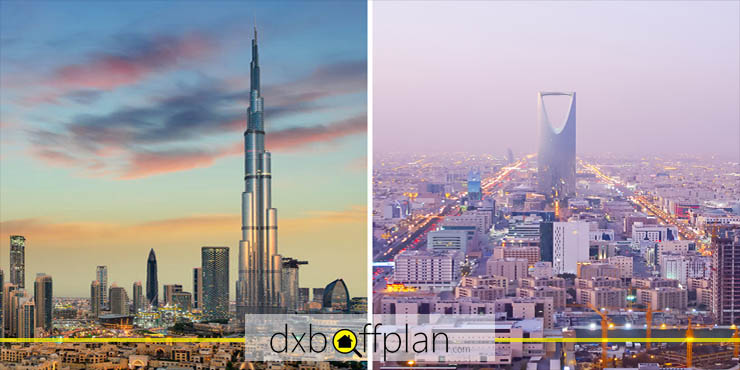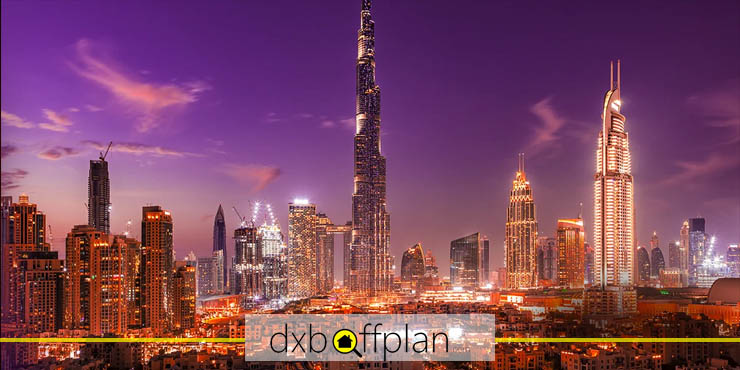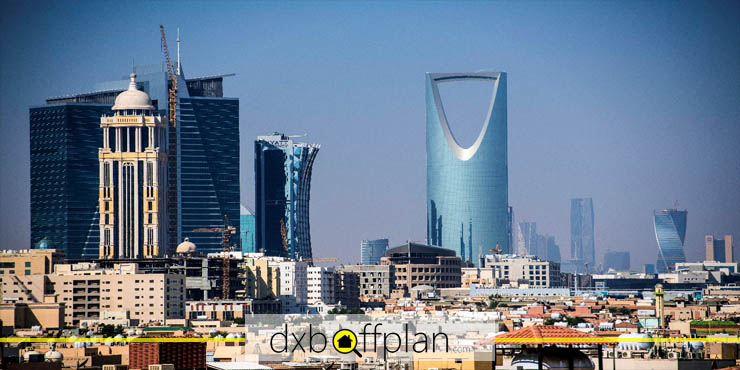Difference Between Investing in Property in Dubai & Saudi Arabia
While investing in the Middle East real estate market, the two most favorable destinations—Dubai and Saudi Arabia—receive more attention than the others. The two nations in recent years have initiated key reforms and hundreds of development projects in their real estate markets, ushering in new platforms to entice foreign investment. Both countries are under serious deliberation among foreign investors, pitting the profitable opportunities and possible issues of each against one another. Between the two, the question on many people’s minds is: Invest in Dubai or Saudi Arabia property? In this article by Dxboffplan, we’d like to provide you with a whole range of information by closely examining the legal and financial aspects of Dubai vs. Saudi Arabia Real Estate.
Comparative Analysis of Foreign Ownership Laws in Dubai and Saudi Arabia
One of the first areas of comparison between the Saudi Arabian and Dubai real estate markets is how these countries approach the issue of foreign property ownership.
Dubai Foreign Ownership Laws
In Dubai, the lawmakers reserved lands referred to as “Freehold” with the aim of attracting foreign investment. Foreigners are allowed to own property in these lands. Dubai has had well-defined legal structures in place throughout to facilitate foreigner purchases of property, the Saudi Arabian market is still in the process of adapting to these rules.
Saudi Arabia Foreign Ownership Laws
Conversely, Saudi Arabia recently made efforts to open a new window for foreign investors to invest in its property market. Under the Vision 2030 program, the Saudi government allowed foreigners to become property owners in some cities such as Riyadh. However, this type of ownership does not go without restrictions. In most cases, the investors must obtain formal approvals from the government agencies, and the buying process is slower compared to Dubai.
Furthermore, the legal and procedural system for foreign purchases of Saudi Arabian real estate remains less straightforward.
Dubai vs Saudi Arabia: Hidden Investment Costs
One of the deciding points in choosing to buy property in a foreign country is a review of the tax system and associated costs. These can directly influence the return on investment and the overall cost to buyers. Let’s have a closer look:
Dubai Hidden Investment Costs
In Dubai, the tax legislation is drafted to encourage foreign investment. For instance, the city does not charge individual income tax, and property owners also do not pay annual property taxes. The only charges that must be taken into account when buying property are the registration fee (approximately 4% of the transaction value) and administrative and service fees imposed by the Dubai Land Department and the development companies. This policy has made Dubai one of the most transparent and lowest-cost markets for international investors. In Dubai, all fees are announced comprehensively upfront at the very first stage of the deal and are extremely transparent in nature.
Saudi Arabia Hidden Investment Costs
Saudi Arabia doesn’t have an income tax, like Dubai, but a different tax system on the sale and purchase of properties. The Saudi Arabian government charges a 5% Value Added Tax (VAT) for the sale and purchase of properties. In Saudi Arabia, some fees might be incurred at different phases of administration or upon the approval of permits and thereby complicate the investment process for the foreign investor.
Return on Investment Analysis in Dubai and Saudi Arabia
One of the strongest indicators in determining a real estate market is to track the purchase price and the return on investment in the form of rental income or capital gain on the property over time. This indicator is vital for investors and is the primary factor in making a decision.
Dubai Return on Investment Analysis
Fast urbanization, tourist hotspots, hosting world events, and modern infrastructure have created enormous demand for property, especially in active places. Rental yields in various projects thus vary between 6% and 8% and even in some specific locations are over 9%. These rates are much higher than the world average, and therefore Dubai is among the top favorable real estate markets for short- and medium-term
Saudi Arabia Return on Investment Analysis
Particularly in regions like Riyadh, there has been a consistent appreciation in Saudi Arabia property prices in the past two years. Vision 2030 mega projects have driven long-term property price appreciation. Rental yield percentages in the country are, however, lower than those in Dubai and tend to range between 3% and 5%. This is due to fewer foreign tenants and tourists in Saudi Arabia than in Dubai. The most significant advantage of the Saudi market to investors is economic stability and government assistance in projects related to infrastructure development, with a strong long-term growth outlook. Although the rental yields are lower, long-term appreciation of property can compensate for the gap.
Property Price in Dubai and Saudi Arabia
The table below gives a comparison of Riyadh property prices and those in central and suburban areas of Dubai:
| Comparison Metric | Riyadh | Dubai |
| Price per square meter (city center) | 9,189.01 SAR (8,995.73 AED) | 26,276.16 SAR (25,723.49 AED) |
| Price per square meter (outside center) | 6,583.33 SAR (6,444.86 AED) | 14,118.82 SAR (13,821.86 AED) |
As can be seen from this table, property prices in Dubai per square meter, central as well as otherwise, are much higher compared to Riyadh. The price variation can be due to higher demand, superior infrastructure, and a more competitive business environment in Dubai.
Residency Through Investment In Real Estate: Which Country Provides An Easier Route?
The most attractive property buying proposition in Gulf nations is the ability to acquire residency in Dubai through real estate investment. This is most helpful for individuals attempting to immigrate, start a business, or live in a safe and quality environment. Here is a more in depth look:
Dubai Residency Options
The foreign investors can obtain a residency visa of 2-10 years in Dubai if they make a purchase of property valued at a minimum of 2 million AED. This residency, or Golden Visa, is given to eligible people and allows them to live in the UAE, have a bank account, obtain a driver’s license, create a company, and avail numerous citizen privileges. This visa also does not need a local sponsor, which is a huge advantage for investors. This application for the visa is relatively fast, entirely online, and can be renewed if the property ownership is maintained.
Saudi Arabia Residency Options
In Saudi Arabia, the authorities have launched initiatives to offer residency to investors through such schemes as the Premium Residency or Special Residency. However, the process of obtaining residency through the purchase of property is not as elaborate and simple as that of Dubai. Investors need to produce some documentation and pay relatively substantial fees to apply for this type of residency, and the approval process can be time-consuming and complicated. Furthermore, these schemes are in the development stage and are open to change, and they are currently not actively marketed publicly.
Dubai vs Saudi Arabia: Opportunities and Challenges
In this piece, we present the most noteworthy benefits and challenges of the Dubai and Saudi real estate markets:
Investment Opportunities in Dubai
When we discuss Dubai vs. Saudi Arabia Real Estate, the obvious edge belongs to Dubai but what exactly are the benefits and what are the challenges? Here is a quick look:
- Dynamic and rapidly changing market: One of the most developed cities of the region, Dubai, has created a dynamic and competitive market with a high rate of attraction for foreign investment. Dubai’s free zones residential, commercial, and tourist projects are also growing steadily for investment purposes as well.
- Clarity in rules and ease of procedures: Dubai’s law on foreign ownership, property registration, and title transfer legislation are designed to be clear and online. Such clarity has served to attract investors to the market with higher confidence.
- World-class urban infrastructure: Dubai’s urban infrastructure, public transport system, healthcare, educational and recreational facilities are of world-class quality, which increases long-term property value.
Challenges in Dubai Investment
- Extremely high levels of competition in certain areas: Because of the extremely high number of developments under way, extremely high levels of competition between developers in certain areas such as Downtown, Marina, and Jumeirah Village Circle put pressure on prices.
- Fluctuations in market price: The Dubai property market is subject to fluctuations. Depending on the global economy’s health, oversupply, or weak demand, property prices can have a sudden drop or surge.
Investment Sectors in Saudi Arabia
You can’t have a thorough understanding of Dubai vs. Saudi Arabia Real Estate without exploring its investment sector advantages and challenges. Here is a closer:
- Gradual and stable market growth: particularly in Riyadh and Jeddah, we see stable growth thanks to the government which increases the confidence of long-term investors.
- Government support: the policies in The Vision 2030 to attract foreign investment indicate easier residency schemes and tax exemptions
Investment Challenges in Saudi Arabia
- Lack of legal openness: investors feel that the need to obtain more than one license from the government takes unnecessary time.
- Foreign ownership limitations: Saudi Arabia is still in the process of letting foreign nationals own property there which limits investors’ options.
Final Words
Investing in Dubai vs. Saudi Arabia Real Estate depends solely on your goals and requirements. If you seek quicker returns, easier legal procedures, and direct exposure to the facilities of residency, Dubai is a tried and tested place. But if you are looking for a long-term investment that is stable and yields gradual results Saudi Arabia is also worth your consideration.
Government support, huge urban expansion, and focus on foreign capital attraction have turned the country into a rising force in the real estate business.
Our recommendation at Dxboffplan is that before you make any decision, contact our experienced consultants so that you can make the most suitable decision according to your budget, investment plans, and immigration needs. Our experts are available 24/7 to offer you free consultations!
frequently asked questions
Dubai has a more clear and fast procedure to international buyers.
Yes, but Dubai's is more developed with 2–10 year visas. The programs of Saudi Arabia are newer and fewer in quantity.
Dubai offers higher rental yields (6–9%) compared to the Saudi Arabian which offers 3–5%.










